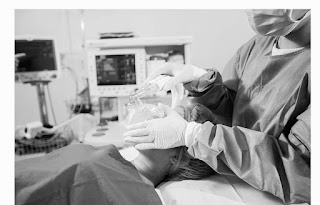Preoperative Fasting and Reducing the Risk of Pulmonary Aspiration
- Recommendations for Clear Liquids. It is appropriate to fast from intake of clear liquids at least 2 h before elective procedures requiring general anesthesia, regional anesthesia, or sedation/analgesia (i.e., monitored anesthesia care). Examples of clear liquids include, but are not limited to, water,fruit juices without pulp, carbonated beverages, clear tea, and black coffee. These liquids should not include alcohol. The volume of liquid ingested is less important than the type of liquid ingested.
- Recommendations for Breast Milk. It is appropriate to fast from intake of breast milk at least 4 h before elective procedures requiring general anesthesia, regional anesthesia, or sedation/analgesia (i.e., monitored anesthesia care).
- Recommendations for Infant Formula. It is appropriate to fast from intake of infant formula at least 6 h before elective procedures requiring general anesthesia, regional anesthesia, or sedation/analgesia (i.e., monitored anesthesia care).
- Recommendations for Solids and Nonhuman Milk. It is appropriate to fast from intake of a light meal or nonhuman milk 6 h or more before elective procedures requiring general anesthesia, regional anesthesia, or sedation/analgesia (i.e., monitored anesthesia care). The Task Force notes that intake of fried or fatty foods or meat may prolong gastric emptying time. Additional fasting time (e.g., 8 h or more) may be needed in these cases. Both the amount and type of food ingested must be consideredwhen determining an appropriate fasting period. Because nonhuman milk is similar to solids in gastric emptying time, the amount ingested must be considered when determining an appropriate fasting period.
- Recommendations for Gastrointestinal Stimulants (e.g., metoclopramide). The routine preoperative use of gastrointestinal stimulants to decrease the risk of pulmonary aspiration in patients who have no apparent increased risk for pulmonary aspiration is not recommended.
- Recommendations for Preoperative Pharmacologic Blockade of Gastric Acid Secretion (e.g., Histamine-2 receptor antagonists, Proton pump inhibitors). The routine preoperative use of medications that block gastric acid secretion to decrease the risks of pulmonary aspiration in patientswho have no apparent increased risk for pulmonary aspiration is not recommended.
- Recommendations for Preoperative Antacids (e.g., sodium citrate, magnesium trisilicate). The routine preoperative use of antacids to decrease the risks of pulmonary aspiration in patients who have no apparent increased risk for pulmonary aspiration is not recommended. Only nonparticulate antacids should be used when antacids are indicated for selected patients for purposes other than reducing the risk of pulmonary aspiration.
- Recommendations for Preoperative Antiemetics (e.g., droperidol and ondansetron). The routine preoperative use of antiemetics to reduce the risks of pulmonary aspiration in patients who have no apparent increased risk for pulmonary aspiration is not recommended.
According to Practice Guidelines for Preoperative Fasting and the Use of Pharmacologic Agents to Reduce the Risk of Pulmonary Aspiration: Application to Healthy Patients
Undergoing Elective Procedures
An Updated Report by the American Society of Anesthesiologists
Committee on Standards and Practice Parameters



